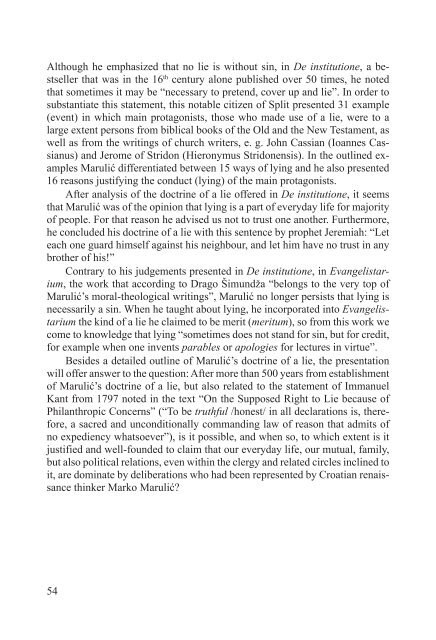Programska knjižica - Hrvatsko filozofsko društvo
Programska knjižica - Hrvatsko filozofsko društvo
Programska knjižica - Hrvatsko filozofsko društvo
Create successful ePaper yourself
Turn your PDF publications into a flip-book with our unique Google optimized e-Paper software.
Although he emphasized that no lie is without sin, in De institutione, a bestseller<br />
that was in the 16 th century alone published over 50 times, he noted<br />
that sometimes it may be “necessary to pretend, cover up and lie”. In order to<br />
substantiate this statement, this notable citizen of Split presented 31 example<br />
(event) in which main protagonists, those who made use of a lie, were to a<br />
large extent persons from biblical books of the Old and the New Testament, as<br />
well as from the writings of church writers, e. g. John Cassian (Ioannes Cassianus)<br />
and Jerome of Stridon (Hieronymus Stridonensis). In the outlined examples<br />
Marulić differentiated between 15 ways of lying and he also presented<br />
16 reasons justifying the conduct (lying) of the main protagonists.<br />
After analysis of the doctrine of a lie offered in De institutione, it seems<br />
that Marulić was of the opinion that lying is a part of everyday life for majority<br />
of people. For that reason he advised us not to trust one another. Furthermore,<br />
he concluded his doctrine of a lie with this sentence by prophet Jeremiah: “Let<br />
each one guard himself against his neighbour, and let him have no trust in any<br />
brother of his!”<br />
Contrary to his judgements presented in De institutione, in Evangelistarium,<br />
the work that according to Drago Šimundža “belongs to the very top of<br />
Marulić’s moral-theological writings”, Marulić no longer persists that lying is<br />
necessarily a sin. When he taught about lying, he incorporated into Evangelistarium<br />
the kind of a lie he claimed to be merit (meritum), so from this work we<br />
come to knowledge that lying “sometimes does not stand for sin, but for credit,<br />
for example when one invents parables or apologies for lectures in virtue”.<br />
Besides a detailed outline of Marulić’s doctrine of a lie, the presentation<br />
will offer answer to the question: After more than 500 years from establishment<br />
of Marulić’s doctrine of a lie, but also related to the statement of Immanuel<br />
Kant from 1797 noted in the text “On the Supposed Right to Lie because of<br />
Philanthropic Concerns” (“To be truthful /honest/ in all declarations is, therefore,<br />
a sacred and unconditionally commanding law of reason that admits of<br />
no expediency whatsoever”), is it possible, and when so, to which extent is it<br />
justified and well-founded to claim that our everyday life, our mutual, family,<br />
but also political relations, even within the clergy and related circles inclined to<br />
it, are dominate by deliberations who had been represented by Croatian renaissance<br />
thinker Marko Marulić?<br />
54

















